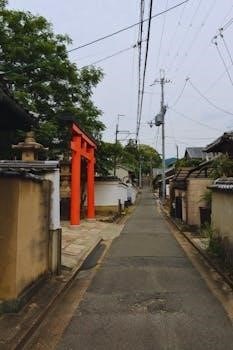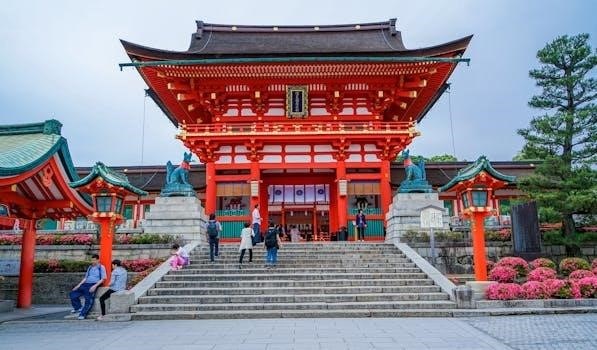Embarking on a journey to Japan? Learning basic travel phrases is crucial for a smoother experience. This guide offers essential Japanese for tourists. Knowing key phrases will greatly enhance your travels and interactions. Prepare to explore Japan with confidence!
Importance of Learning Basic Japanese for Travel
Understanding basic Japanese phrases is more than just a courtesy; it’s a gateway to a richer and more immersive travel experience. While many Japanese people in tourist areas may understand some English‚ venturing beyond these zones often reveals a limited proficiency. Knowing even simple greetings and key phrases will significantly ease your interactions with locals‚ allowing you to navigate public transportation‚ order food at restaurants‚ and ask for directions more effectively. This is not only practical but also demonstrates respect for the local culture‚ fostering genuine connections and enhancing your overall travel adventure. Furthermore‚ being able to communicate basic needs in Japanese can be incredibly helpful in emergency situations‚ ensuring your safety and well-being. So‚ consider learning a few phrases‚ and you will unlock a deeper and more rewarding journey in Japan.

Japanese Language Fundamentals
The Japanese language uses three scripts⁚ Hiragana‚ Katakana‚ and Kanji. Understanding basic pronunciation is key for travelers. These fundamentals will aid your communication in Japan.
Japanese Writing Systems⁚ Hiragana‚ Katakana‚ Kanji
The Japanese writing system is composed of three distinct scripts⁚ Hiragana‚ Katakana‚ and Kanji. Hiragana and Katakana are phonetic syllabaries‚ each containing . Hiragana is primarily used for native Japanese words and grammatical elements. Katakana is mainly for foreign words‚ onomatopoeia‚ and emphasis. Kanji‚ borrowed from Chinese characters‚ represents whole words or concepts‚ adding layers of meaning to the language. Mastering all three is not essential for basic travel phrases‚ but understanding their differences can be helpful. While travelers don’t need to learn to write‚ recognizing them provides a deeper insight into the written language. Familiarity with these three scripts offers a richer appreciation for the complexity and beauty of written Japanese. Focusing on key travel phrases will still be highly beneficial.
Basic Pronunciation Guide for Travelers
Japanese pronunciation is generally straightforward‚ with each syllable typically pronounced clearly. Vowels are similar to those in Spanish or Italian‚ with ‘a’ as in “father‚” ‘i’ as in “machine‚” ‘u’ as in “flute‚” ‘e’ as in “bed‚” and ‘o’ as in “go.” Consonants are usually pronounced as in English‚ with some exceptions. For instance‚ ‘r’ is often a soft‚ almost ‘l’ sound‚ and ‘g’ can sometimes sound like ‘ng.’ The ‘u’ at the end of ‘desu’ or ‘masu’ is frequently silent or very soft. Pay attention to pitch accent‚ as this can change the meaning of words. While perfect pronunciation may be challenging‚ focusing on clear‚ consistent sounds will greatly aid in comprehension; This guide provides essential tips for travelers.

Essential Travel Phrases
This section provides key Japanese phrases for travelers. Learn greetings‚ transportation‚ dining‚ shopping‚ and emergency phrases. These will greatly enhance your travel experience in Japan.
Greetings and Basic Expressions
Mastering basic greetings is the first step to connecting with locals in Japan. Start with “Konnichiwa” (こんにちは)‚ which is a versatile greeting for “hello” or “good afternoon.” For “good morning‚” use “Ohayō gozaimasu” (おはようございます)‚ and for “good evening‚” say “Konbanwa” (こんばんは). Express gratitude with “Arigato gozaimasu” (ありがとうございます)‚ meaning “thank you.” A simpler “Arigato” (ありがとう) is fine for casual situations. To say “you’re welcome‚” use “Dōitashimashite” (どういたしまして). When you want to ask “how are you?” say “Ogenki desu ka?” (お元気ですか?)‚ and you can reply “Genki desu” (元気です) to say “I’m fine.” Understanding these basic phrases will significantly improve your interactions and make your travel experience more enjoyable and respectful. These simple expressions can open doors and show your effort to engage with the culture. Remember that a polite approach is highly valued in Japan.

Transportation Phrases⁚ Trains‚ Taxis‚ and Payment
Navigating Japan’s efficient transportation system requires some key phrases. When taking a train‚ ask “Eki wa doko desu ka?” (駅はどこですか?) to inquire “Where is the station?”. To buy a ticket‚ use “Kippu o kudasai” (切符をください)‚ meaning “ticket please.” In a taxi‚ say “~made onegaishimasu” (~までお願いします) followed by your destination‚ meaning “to ~ please.” When asking the fare‚ you can say “Ryōkin wa ikura desu ka?” (料金はいくらですか?) which means “How much is the fare?”. For payment‚ the phrase “Kaado de haraemasu ka?” (カードで払えますか?) means “Can I pay by card?” If you are paying in cash you can say “Genkin de haraimasu” (現金で払います) meaning “I will pay in cash”. Understanding these basic transportation phrases is crucial for a smooth travel experience‚ and will allow you to get around with ease and confidence. This knowledge will minimize confusion and ensure that you reach your destinations without any major issues.
Phrases for Dining and Restaurants
Dining in Japan is an experience‚ and knowing a few phrases will enhance it. When entering a restaurant‚ you can say “Konbanwa” (こんばんは) for “Good evening” or simply “Sumimasen” (すみません) to get the staff’s attention. To ask for a table‚ say “Seki wa aiteimasu ka?” (席は空いていますか?)‚ meaning “Is there a table available?”. When ordering‚ use “~o kudasai” (~をください) which means “I would like ~”. If you are unsure about what to order‚ ask “Osusume wa nan desu ka?” (おすすめは何ですか?) which translates to “What do you recommend?”. To ask for the bill‚ say “Okaikei onegaishimasu” (お会計お願いします). If you are ready to pay‚ use “Gochisosama deshita” (ごちそうさまでした) to show gratitude after the meal. This phrase means “Thank you for the meal”. These simple phrases will greatly improve your dining encounters and show respect.
Shopping and Asking for Prices
Navigating Japanese shops is easier with a few essential phrases. When you see something you like‚ you can ask “Kore wa ikura desu ka?” (これはいくらですか?) which means “How much is this?”. If you want to know if they have a specific item‚ say “~wa arimasu ka?” (~はありますか?)‚ replacing the blank with the item name. To inquire about different colors or sizes‚ use “~no iro wa arimasu ka?” (~の色はありますか?) for color‚ and “~no saizu wa arimasu ka?” (~のサイズはありますか?) for sizes. If you are looking for a specific item‚ say “~o sagashite imasu” (~を探しています)‚ which means “I’m looking for ~”. When you decide to buy an item‚ you can say “Kore o kudasai” (これをください)‚ meaning “I’ll take this one.” Knowing these phrases will help you shop more confidently. Remember to be polite and use “arigato gozaimasu” (ありがとうございます) to say “thank you.”
Asking for Directions and Getting Around
Getting around Japan can be simpler with basic directional phrases. If you need directions‚ start with “Sumimasen” (すみません)‚ meaning “Excuse me‚” and then ask “~wa doko desu ka?” (~はどこですか?)‚ which translates to “Where is ~?”. If you want to ask how to get to a specific place‚ you can say “~e wa dou ikeba iidesu ka?” (~へはどう行けばいいですか?)‚ meaning “How do I get to ~?”. To inquire if a location is near‚ use “~wa chikai desu ka?” (~は近いですか?)‚ meaning “Is ~ near?”. If you’re lost‚ saying “Michi ni mayotte imasu” (道に迷っています) which means “I am lost”‚ can be helpful. When asking for a map‚ say “Chizu wa arimasu ka?” (地図はありますか?)‚ meaning “Do you have a map?”. Common directional terms include “migi” (右) for right‚ “hidari” (左) for left‚ “massugu” (まっすぐ) for straight ahead. These phrases will greatly aid your navigation. Always remember to use polite language and thank people for their help.
Hotel and Accommodation Phrases
When checking into your hotel or accommodation in Japan‚ some key phrases can be very useful. Upon arrival‚ you might say “Yoyaku shite imasu” (予約しています)‚ meaning “I have a reservation‚” followed by your name. To ask if a room is available‚ use “Heya wa aite imasu ka?” (部屋は空いていますか?). If you need your room cleaned‚ you could say “Heya no souji o onegaishimasu” (部屋の掃除をお願いします). In case of needing extra towels or amenities‚ ask “Tauru o motto onegaishimasu” (タオルをもっとお願いします) meaning “More towels please” or “Ameniti o onegaishimasu” (アメニティをお願いします)‚ meaning “Amenities‚ please”. For questions about breakfast‚ “Asagohan wa doko desu ka?” (朝ご飯はどこですか?) translates to “Where is breakfast?”. If you need to check out‚ “Chekku auto onegaishimasu” (チェックアウトお願いします) means “Check out please.” These phrases will make your hotel experience smoother. Remember to be polite when interacting with hotel staff‚ and always start with a greeting.
Emergency and Help Phrases
In unforeseen circumstances‚ knowing essential emergency phrases in Japanese can be crucial. If you need help urgently‚ saying “Tasukete kudasai!” (助けてください!) which means “Help me!” is vital. If you are injured‚ “Kega o shimashita” (怪我をしました) translates to “I am injured.” Should you require a doctor‚ the phrase to use is “Isha o yonde kudasai” (医者を呼んでください)‚ meaning “Please call a doctor.” In case of a police emergency‚ saying “Keisatsu o yonde kudasai” (警察を呼んでください) will ask to “Call the police”. If you lose something important‚ like your passport‚ you could say “Pasupoto o nakushimashita” (パスポートをなくしました)‚ meaning “I lost my passport”. To indicate a dangerous situation‚ use “Abunai!” (危ない!)‚ meaning “Danger!”. Remember these phrases as they can help you get assistance quickly. These phrases may be vital in unexpected situations and are essential for any traveler. Always remain calm and polite‚ even during stressful times.

Resources for Learning
To aid your language journey‚ explore phrasebooks designed for travelers. Many free PDF resources offer Japanese travel phrases‚ enhancing your preparation. These tools are invaluable for learning.
Recommended Phrasebooks for Travelers
For those who prefer a tangible learning experience‚ phrasebooks are an excellent choice. Several books are specifically designed to help tourists navigate Japan with ease. These phrasebooks often include essential phrases‚ pronunciation guides‚ and cultural tips. Look for options that cater to your specific needs‚ such as those focusing on common travel scenarios like ordering food or asking for directions. Some popular choices include phrasebooks that offer both romaji (romanized Japanese) and Japanese script‚ aiding in pronunciation and recognition. Consider books that provide vocabulary relevant to transportation‚ dining‚ and accommodation. These resources can prove to be invaluable tools for your journey. Choosing the right phrasebook will give you the confidence to communicate effectively and have a more fulfilling experience. They can provide a more structured approach to learning‚ compared to just using online resources. Remember to select a phrasebook that aligns with your learning style and travel goals.
Free PDF Resources for Japanese Travel Phrases
In addition to phrasebooks‚ numerous free PDF resources are available online‚ offering a convenient way to learn Japanese travel phrases. These downloadable PDFs often contain lists of essential expressions‚ covering greetings‚ transportation‚ dining‚ shopping‚ and more. Many include helpful pronunciation guides to ensure you’re speaking correctly. These resources are particularly useful for travelers who want to learn on the go or prefer a digital format. You can easily download them onto your phone or tablet and have them readily accessible during your travels. Several websites and blogs offer these free PDF guides‚ often tailored to tourist needs. They are typically easy to navigate‚ with clear and concise phrasing. Look for PDFs that include practical phrases and vocabulary. They are a fantastic supplementary learning tool‚ complementing other resources such as phrasebooks. Take advantage of these free resources to enhance your Japanese language skills for your upcoming trip; Remember to select resources from reputable sources.
Using Japanese phrases while traveling greatly enriches your experience. It fosters connections‚ shows respect‚ and makes navigating Japan much easier. Embrace the language and enjoy your journey!
Benefits of Using Japanese Phrases While Traveling
Employing even basic Japanese phrases during your travels in Japan yields numerous advantages. Firstly‚ it significantly enhances your interactions with locals‚ fostering a deeper connection and cultural understanding. Speaking even a few words shows respect and willingness to engage‚ often met with warm hospitality. This can lead to more authentic experiences‚ going beyond the typical tourist trail. Furthermore‚ knowing essential phrases makes navigating daily situations much easier. Ordering food‚ asking for directions‚ and shopping become less daunting and more enjoyable. It also reduces the reliance on gestures or translation apps‚ allowing for smoother and faster communication. In emergencies‚ basic phrases can be crucial for seeking assistance. Ultimately‚ learning Japanese travel phrases empowers you‚ making you feel more confident and independent as you explore this fascinating country. This contributes to a more immersive and rewarding travel experience‚ leaving you with cherished memories and a deeper appreciation for Japanese culture and people.



